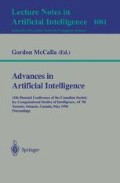Abstract
In order to represent cooperative multi-agents who must reason with uncertain knowledge, a coherent framework is necessary. We choose multiply sectioned Bayesian networks (MSBNs) as the basis for this study because they are based on well established theory on Bayesian networks and because they are modular. In this paper, we focus on the semantics of a MSBN-based multi-agent system (MAS) for cooperative distributed interpretation. In particular, we establish the conditions under which the joint probability distribution of a MSBN-based MAS can be meaningfully interpreted. These conditions imply that a coherent MSBN-based MAS can be constructed using agents built by different developers. We show how the conditions can be satisfied technically under such a context.
Preview
Unable to display preview. Download preview PDF.
References
A.H. Bond and L. Gasser. An analysis of problems and research in dai. In A.H. Bond and L. Gasser, editors, Readings in Distributed Artificial Intelligence, pages 3–35. Morgan Kaufmann, 1988.
A.H. Bond and L. Gasser, editors. Readings in Distributed Artificial Intelligence. Morgan Kaufmann, 1988.
A.P. Dawid and S.L. Lauritzen. Hyper markov laws in the statistical analysis of decomposable graphical models. Annals of Statistics, 21(3):1272–1317, 1993.
L. Gasser and M.N. Huhns, editors. Distributed Artificial Intelligence, Volume II. Morgan Kaufmann, 1989.
C. Ghezzi, M. Jazayeri, and D. Mandrioli. Fundamentals of Software Engineering Prentice Hall, 1991.
F.V. Jensen, S.L. Lauritzen, and K.G. Olesen. Bayesian updating in causal probabilistic networks by local computations. Computational Statistics Quarterly, (4): 269–282, 1990.
S.L. Lauritzen and D.J. Spiegelhalter. Local computation with probabilities on graphical structures and their application to expert systems. Journal of the Royal Statistical Society, Series B, (50): 157–244, 1988.
V.R. Lesser and L.D. Erman. Distributed interpretation: a model and experiment. IEEE Transactions on Computers, C-29(12):1144–1163, 1980.
R.E. Neapolitan. Probabilistic Reasoning in Expert Systems. John Wiley and Sons, 1990.
J. Pearl. Probabilistic Reasoning in Intelligent Systems: Networks of Plausible Inference. Morgan Kaufmann, 1988.
D. Poole, A. Mackworth, and R. Goebel. Computational Intelligence: A Logical Approach. Oxford University Press, forthcoming, 1996.
W.A. Shay. Understanding Data Communications and Networks. PWS Publishing, 1995.
A. Silberschatz and P.B. Galvin. Operating System Concepts. Addison Wesley, 1994.
M. Wooldridge and N.R. Jennings. Intelligent agents: theory and practice. Knowledge Engineering Review, 10(2):115–152, 1995.
Y. Xiang. Distributed multi-agent probabilistic reasoning with bayesian networks. In Z.W. Ras and M. Zemankova, editors, Methodologies for Intelligent Systems, pages 285–294. Springer-Verlag, 1994.
Y. Xiang. Distributed scheduling of multiagent systems. In Proc. 1st International Conf. on Multi-agent Systems, pages 390–397, San Francisco, CA, 1995.
Y. Xiang. Optimization of inter-subnet belief updating in multiply sectioned bayesian networks. In Proc. Eleventh Conference on Uncertainty in Artificial Intelligence, pages 565–573, Montreal, Quebec, 1995.
Y. Xiang. Distributed structure verification in multiply sectioned bayesian networks. In To appear in Proc. Florida AI Research Symposium, 1996.
Y. Xiang, B. Pant, A. Eisen, M. P. Beddoes, and D. Poole. Multiply sectioned bayesian networks for neuromuscular diagnosis. Artificial Intelligence in Medicine, 5:293–314, 1993.
Y. Xiang, D. Poole, and M. P. Beddoes. Multiply sectioned bayesian networks and junction forests for large knowledge based systems. Computational Intelligence, 9(2):171–220, 1993.
Author information
Authors and Affiliations
Editor information
Rights and permissions
Copyright information
© 1996 Springer-Verlag Berlin Heidelberg
About this paper
Cite this paper
Xiang, Y. (1996). Semantics of multiply sectioned Bayesian networks for cooperative multi-agent distributed interpretation. In: McCalla, G. (eds) Advances in Artifical Intelligence. Canadian AI 1996. Lecture Notes in Computer Science, vol 1081. Springer, Berlin, Heidelberg. https://doi.org/10.1007/3-540-61291-2_53
Download citation
DOI: https://doi.org/10.1007/3-540-61291-2_53
Published:
Publisher Name: Springer, Berlin, Heidelberg
Print ISBN: 978-3-540-61291-9
Online ISBN: 978-3-540-68450-3
eBook Packages: Springer Book Archive

